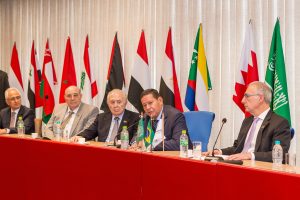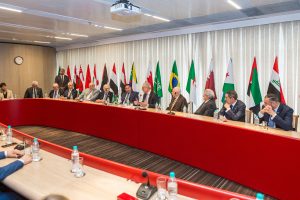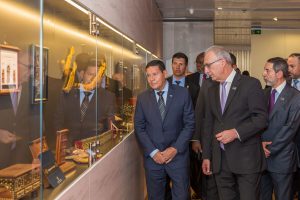São Paulo – Brazil’s vice president Hamilton Mourão said this Monday (2) that even though the country already sustains strategic relations with the Arab world, economic ties can increase even further. “I already consider relations to be strategic at this point, because trade in foodstuffs is very solid, and food security is a strategic issue for any country,” he told ANBA and TV Brasil in an interview while visiting the Arab Brazilian Chamber of Commerce in São Paulo, where he attended a luncheon event in his honor.

While standing next to Arab Chamber president Rubens Hannun, Mourão stressed that Brazil can make use of the food industry’s connections in the region to branch out into other fields. “Brazil has an amazing capacity to produce food and get it to the tables of other people around the world, world-class food products, and to me this is a wide avenue that we can make progress in,” he said. “At the same time, our trade is moving into other higher value-added products,” he said.
Exports from Brazil to Arab countries grossed USD 10.34 billion year-to-date through October 2019, up 10.7% from a year ago, according to Arab Brazilian Chamber data. Food and beverages accounted for USD 6.4 billion, or 62% of that amount. However, sales increased significantly for items including iron and steel pipes, semi-finished gold products, and aircraft turbines and parts.
The vice president said the Arab Chamber is supporting Brazil’s government in promoting relations with Arab countries since its inception in 1952. “Arab countries are an extremely important market to our country, and we are making more and more progress in our relations,” he said. “And here in Brazil we have a large number of Brazilian descendants of Arabs, and the Chamber of Commerce also works to enhance this connection, so I find what these people here (at the Chamber) do is admirable in terms of connecting our peoples,” he said.
Investment

Apart from the enhancement of trade, Mourão believes that Brazil could attract more investment from Arab countries, and that it should seek out partnerships in technology. “Arab investment funds boast a wide range of resources, so we could pull them into investing here in Brazil, because now, more than ever, we need private partners in infrastructure-related fields, like road, railway, port and airport concessions,” he said, “and it is evident that we must seek bigger partnerships in technology products.”
During president Jair Bolsonaro’s late October tour of Arab countries in the Gulf, Saudi Arabia’s Public Investment Fund (PIF) announced that it intends to invest as much as USD 10 billion in Brazil. In the United Arab Emirates, agreements were reached to “bring bilateral relations to strategic partnership status,” covering economic cooperation, investment, industry, infrastructure, transportation, the space industry, energy, etc.
The vice president also said both Brazil and the Arab countries are interested in having direct shipping lanes to streamline deal-making. “There is this demand for direct shipping, with ships sailing off with goods from Brazil and sailing back in with Arab goods, and I think that in terms of trade, this is what we need to envision going forward,” he said.
Aside from economic affairs, Mourão believes Brazil could be helpful in Middle East peace talks. “I find that Brazil, being a peaceful country in nature, can and should cooperate and take part in the Middle East peace process,” he said. He mentioned the prominence of Arab peoples in world history. “Arab culture is widespread in many places around the world, and it is important for everyone to understand this,” he said.
Rapport-building

Before lunch, the vice president sat down with the Arab Chamber board. Hannun discussed this year’s exports from Brazil to the Arab countries, and like Mourão, he stressed the hike in non-food product sales. This growth was driven by diversification and the sale of higher value-added items,” he said.
Hannun recalled the first time the Chamber’s board and the vice president had a meeting, during the transition between administrations last year, and pointed out that Brazilian-Arab relations have evolved since then. “We feel a closer rapport between our government and the Arab countries, which came into fruition in several very important visits by top-tier government officials to some of the 22 [Arab] countries.” Apart from Bolsonaro’s tour, he mentioned Mourão’s own trip to Lebanon and the mission led by Brazil’s Agriculture minister Tereza Cristina to Egypt, the UAE, Kuwait and Saudi Arabia.
“Relations between our countries are evolving into strategic partnership status, which is something the Arabs look forward to, and which is very productive and advantageous to our countries,” the Arab Chamber’s president said. “Through real partnerships we can be sure that we will offload our products, get funding for our logistics infrastructure, and get key ingredients for our industry, our daily lives and our farm products – like oil and fertilizers, for instance,” he went on.
Hannun also invited the vice president to speak at the logistics forum that the organization will hold with the Union of the Arab Chambers in Alexandria, Egypt. “Surely your excellency’s presence and lecture will provide an even bigger thrust to our relations, as well as reinforce the Brazilian government’s positive overtures to this market,” he concluded.
Translated by Gabriel Pomerancblum








